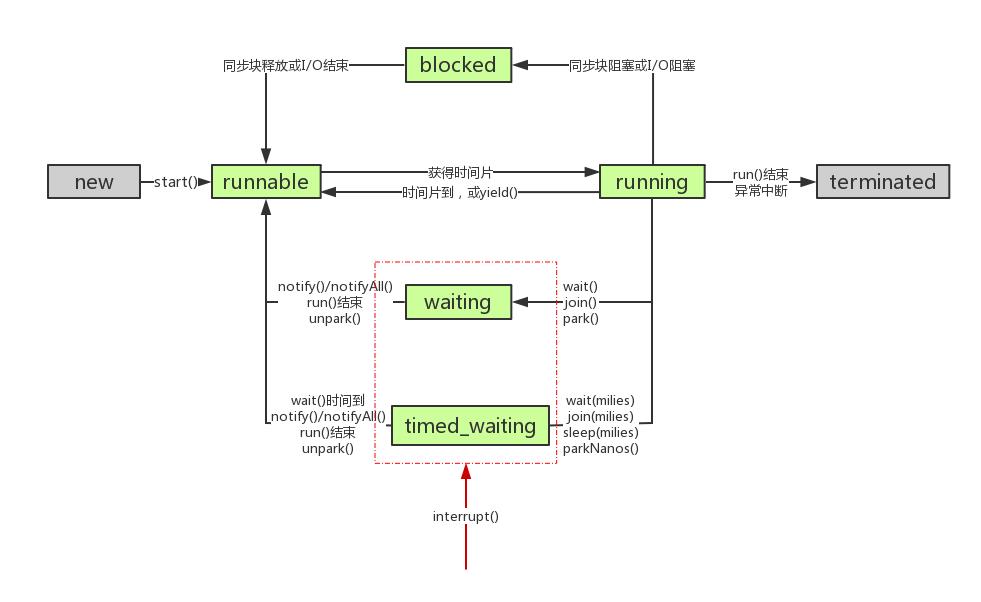内核线程Java线程与内核线程区别
Posted 饭小胖
tags:
篇首语:本文由小常识网(cha138.com)小编为大家整理,主要介绍了内核线程Java线程与内核线程区别相关的知识,希望对你有一定的参考价值。
线程状态转换
以下为大部分操作系统给出的线程状态,但和java的线程状态不是一回事,java是封装了操作系统线程状态的

JVM线程模型
要注意:
- 系统进行IO的时候,系统线程是属于阻塞状态等待中断发生的,而JVM线程体现出来的状态是Runnable
- JVM中,Runnable状态包括系统线程的runnable和running状态
/** * A thread state. A thread can be in one of the following states: * <ul> * <li>{@link #NEW}<br> * A thread that has not yet started is in this state. * </li> * <li>{@link #RUNNABLE}<br> * A thread executing in the Java virtual machine is in this state. * </li> * <li>{@link #BLOCKED}<br> * A thread that is blocked waiting for a monitor lock * is in this state. * </li> * <li>{@link #WAITING}<br> * A thread that is waiting indefinitely for another thread to * perform a particular action is in this state. * </li> * <li>{@link #TIMED_WAITING}<br> * A thread that is waiting for another thread to perform an action * for up to a specified waiting time is in this state. * </li> * <li>{@link #TERMINATED}<br> * A thread that has exited is in this state. * </li> * </ul> * * <p> * A thread can be in only one state at a given point in time. * These states are virtual machine states which do not reflect * any operating system thread states. * * @since 1.5 * @see #getState */ public enum State { /** * Thread state for a thread which has not yet started. */ NEW, /** * Thread state for a runnable thread. A thread in the runnable * state is executing in the Java virtual machine but it may * be waiting for other resources from the operating system * such as processor. */ RUNNABLE, /** * Thread state for a thread blocked waiting for a monitor lock. * A thread in the blocked state is waiting for a monitor lock * to enter a synchronized block/method or * reenter a synchronized block/method after calling * {@link Object#wait() Object.wait}. */ BLOCKED, /** * Thread state for a waiting thread. * A thread is in the waiting state due to calling one of the * following methods: * <ul> * <li>{@link Object#wait() Object.wait} with no timeout</li> * <li>{@link #join() Thread.join} with no timeout</li> * <li>{@link LockSupport#park() LockSupport.park}</li> * </ul> * * <p>A thread in the waiting state is waiting for another thread to * perform a particular action. * * For example, a thread that has called <tt>Object.wait()</tt> * on an object is waiting for another thread to call * <tt>Object.notify()</tt> or <tt>Object.notifyAll()</tt> on * that object. A thread that has called <tt>Thread.join()</tt> * is waiting for a specified thread to terminate. */ WAITING, /** * Thread state for a waiting thread with a specified waiting time. * A thread is in the timed waiting state due to calling one of * the following methods with a specified positive waiting time: * <ul> * <li>{@link #sleep Thread.sleep}</li> * <li>{@link Object#wait(long) Object.wait} with timeout</li> * <li>{@link #join(long) Thread.join} with timeout</li> * <li>{@link LockSupport#parkNanos LockSupport.parkNanos}</li> * <li>{@link LockSupport#parkUntil LockSupport.parkUntil}</li> * </ul> */ TIMED_WAITING, /** * Thread state for a terminated thread. * The thread has completed execution. */ TERMINATED; }
以上是关于内核线程Java线程与内核线程区别的主要内容,如果未能解决你的问题,请参考以下文章